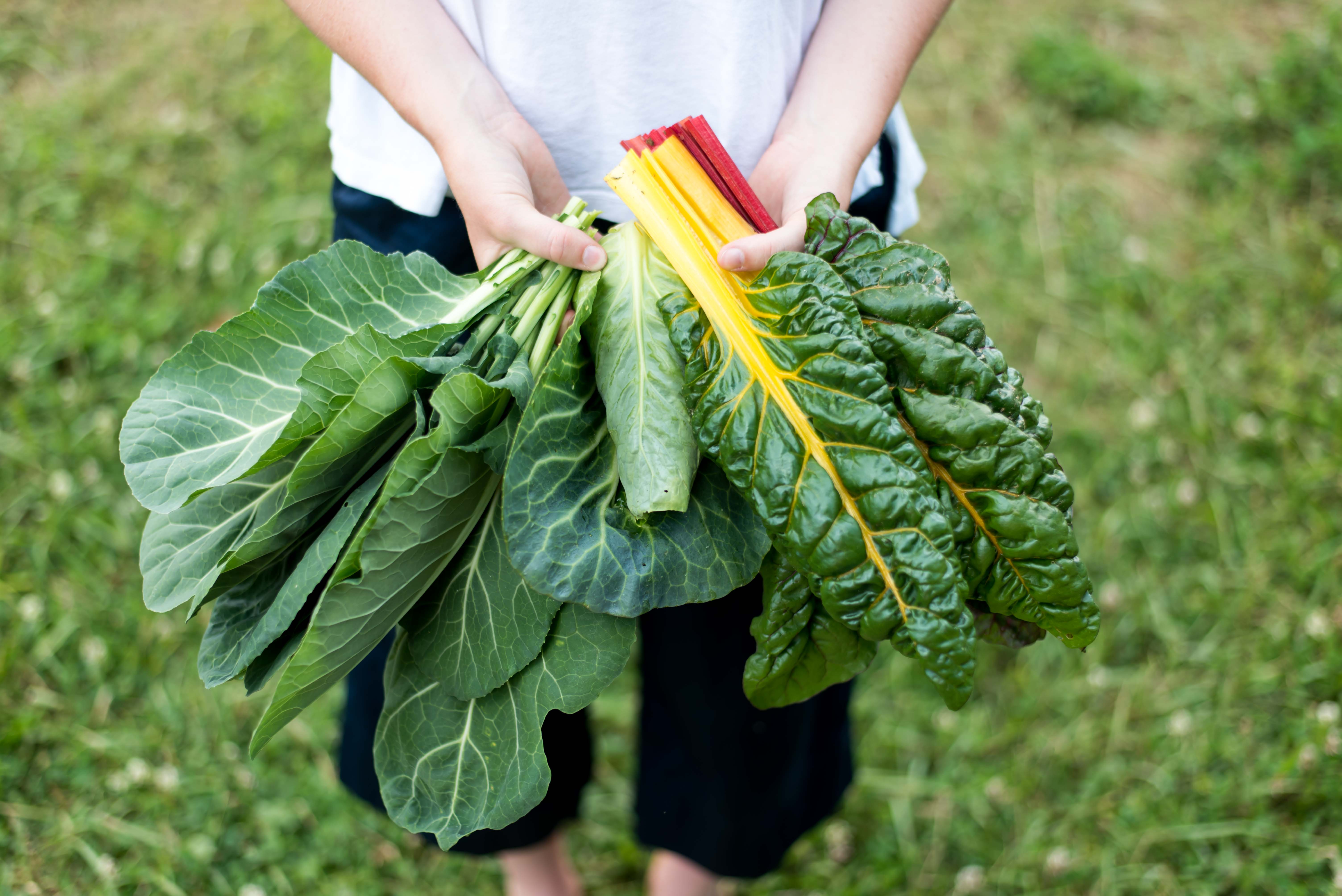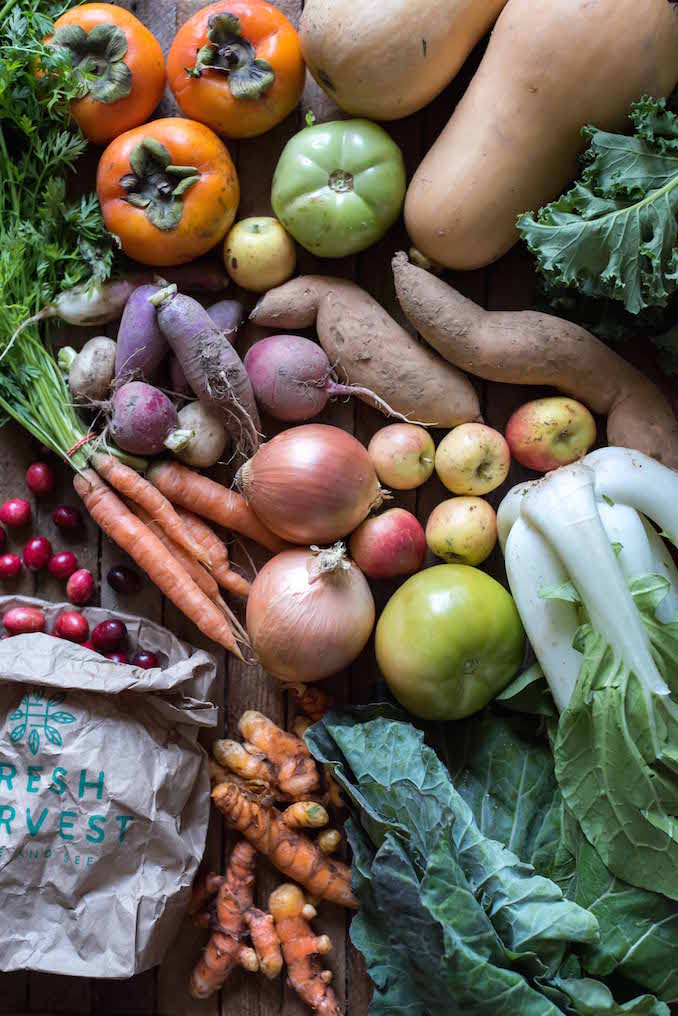
With the rise of the local food movement in social media and general consciousness, you might’ve heard the term “CSA” floating around. What is that? Should you get involved in one? How do you get involved in one? What are the pros, cons, and alternatives? Here’s your guide to those questions:
What does CSA mean?
First things first: CSA stands for Community Supported Agriculture. The idea is that community members (consumers) make an upfront commitment to a farmer, which helps with funding and planning the seasons’ harvests. It’s sometimes called a farm share because each CSA member is effectively buying a percentage or a share of the farm’s harvest. By having a group of people offer their support and agree to purchase a portion of the farm’s yield on a regular basis, the farmer can focus more time and energy on farming rather than marketing and selling.
So how does it work?
A CSA is a model for selling all different types of agricultural products, whether it’s vegetables, fruit, flowers, meat, or some combination of those things. There are many different forms of CSAs, but typically you have the option to buy a full share or a half/partial share. In my experience, a full share of produce is plenty for a family of 4 or more. As a married couple with no children, a half share best suits our needs.
Depending on the length of the growing season in your area, there might be different periods to which you can commit. Perhaps there will be one session (10-20 weeks) from spring to midsummer and another from midsummer to fall, or perhaps one for each season (spring, summer, fall). In each case, you typically have to pay the full cost upfront, and you may get a slight discount for committing to the whole year. You might have the option to get a weekly bag/basket/box of produce, or sometimes farms offer every other week.
The methods for getting your CSA share also varies. Sometimes your CSA pickup will be at the farm, sometimes it’s at a farmers’ market, and sometimes it’s at a third party pickup location. Occasionally the shares are delivered to you, but that is rare in my experience (or requires an extra delivery fee).

What are the pros of subscribing to a CSA?
- You support the local economy and local agriculture
- You reduce your carbon footprint by purchasing less food shipped in from other areas
- You support a farmer’s ability to plan and fund their pursuits
- You get delicious, in-season food
- The weekly cost often comes out to much less than you’d pay otherwise
- You support sustainable growing practices and family farms
- You vote with your dollars and divest from industrial farming practices
- You get exposure to different kinds of food you might not otherwise try
- For those who enjoy cooking, you get a fun challenge to work with what you’re given
- You build a relationship with your farmer
- You become more aware of what is in season
Cons?
- The inflexible schedule
- The large financial commitment upfront
- There is often no option to quit or get a partial refund
- The pickup can be inconveniently located
- The inability to chose what you get each week (in most cases)
- Repetitive offerings can get old, especially if the farm has limited crops
- The liability you assume with farming; if crops fail, you might get less
- For those who travel a lot, some shares might go to waste
Where do I start?
It helps to begin with shopping locally on your own. If you’ve never shopped a local farmers’ market before, subscribing to a CSA might be a big leap. Get to know local farmers and what they offer throughout the year.
Once you’ve found a farmer whose offerings you like, ask them if they offer a CSA. You can also ask your farmers’ market manager which vendors offer CSA shares. Most have signups in late winter to mid-spring (depending on how early your growing season starts), and sometimes they offer another opt-in midsummer.
If you’re feeling more adventurous, start by searching the internet. Try “[your city] CSAs” or “[your city] farm shares” or get more specific with something like “flower CSAs Atlanta.”
I’m not ready to fully commit to a CSA. Are there any alternatives?
Occasionally, farmers will offer a farmstand credit with an incentive. For instance, you might pay $300 for $325 worth of credit that can be spent at the farmer’s booth each week at market throughout the year, at your convenience.
Another option is to split a CSA with a friend. Either alternate weeks or actually split up the haul each week. Having a partner gives you some flexibility to negotiate your weeks off when you’re traveling or otherwise disposed.
In Atlanta, my favorite alternative is Fresh Harvest, a company that serves as a distributor for local farms. You can sign up for a variety of weekly or biweekly baskets that are delivered to your home on a specific day (either Tuesday or Wednesday). Basket sizes range from family size to nano, and there are more tailored options like a juicing basket, a fruit only basket, and a Georgia Grown basket. You can skip any delivery with a few days notice, set travel notifications to stop deliveries while you’re out of town, and swap out any items in your basket that you don’t want ahead of time. They also offer local meats, eggs, baked goods, dairy products, and more that you can optionally add to your delivery. Baskets range from $28 – $73, delivery included.
My personal take:
I’ve subscribed to traditional CSAs in the past, and I’m a big proponent of them! I especially loved the challenge of creating recipes and meals from a sort of mystery basket each week (à la Chopped). Unfortunately, our frequent travels make weekend pickups difficult and weekly farm shares sometimes wasteful. Y’all should know by now that I hate food waste! For the past year or so, I’ve subscribed to Fresh Harvest, getting a mini basket and a dozen eggs every other week. The standard basket was more than we needed for two people, even eating most dinners at home. My basket (actually a reusable tub with reusable ice packs) arrives on Wednesdays, which is especially great on the weeks when I’ve been out of town over the weekend. I still love to shop at local farmers markets when I can, but I’m grateful to have a flexible, CSA-like option to supplement!
Feel free to reach out to me in the comments or via email (kenan [at] kenanhill [dot] com) with any questions about CSAs or Fresh Harvest!
